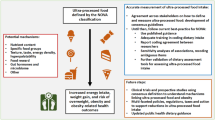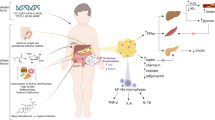Abstract
Purpose
Observational studies have reported an association between metabolic syndrome (MetS) and colorectal cancer risk with inconsistent risk estimates. We conducted this meta-analysis to evaluate the risk of colorectal cancer in individuals with MetS.
Methods
PubMed, Embase, and Web of Science were searched for related studies from database inception to 21 January 2021. Risk estimates for colorectal cancer were extracted from individual articles and pooled using a fixed-effect or random-effect model according to the heterogeneity.
Results
MetS was significantly associated with a higher risk of colorectal cancer in both sexes (relative risk [RR] 1.36, 95% confidence interval [CI] 1.26–1.47, P < 0.001), men (RR 1.33, 95% CI 1.21–1.47, P < 0.001), and women (RR 1.34, 95% CI 1.19–1.52, P < 0.001). The risk of colorectal cancer seemed to increase as the number of MetS components rose. Moreover, the high body mass index (BMI)/waist circumference (WC) and hyperglycemia were all significantly associated with a higher risk of colorectal cancer (RR 1.28 [1.20–1.37] and 1.31 [1.14–1.50] in both sexes, RR 1.31 [1.19–1.45] and 1.23 [1.03–1.46] in men, and RR 1.22 [1.02–1.46] and 1.63 [1.16–2.28] in women, respectively).
Conclusions
MetS was significantly associated with a higher risk of colorectal cancer. The high BMI/WC or hyperglycemia might largely account for this association. Further analysis suggested that, as the number of MetS components increased, the risk of colorectal cancer rose.


Similar content being viewed by others
Availability of data and material
All data generated or analyzed during this study are included in this published article.
References
de Haas E, Oosting S, Lefrandt J et al (2010) The metabolic syndrome in cancer survivors. Lancet Oncol 11:193–203. https://doi.org/10.1016/s1470-2045(09)70287-6
Cornier M, Dabelea D, Hernandez T et al (2008) The metabolic syndrome. Endocr Rev 29:777–822. https://doi.org/10.1210/er.2008-0024
O’Sullivan D, Sutherland R, Town S et al (2021) Risk factors for early-onset colorectal cancer: a systematic review and meta-analysis. Clinical gastroenterology and hepatology : the official clinical practice journal of the American Gastroenterological Association. https://doi.org/10.1016/j.cgh.2021.01.037
Moore J, Chaudhary N, Akinyemiju T (2017) Metabolic syndrome prevalence by race/ethnicity and sex in the United States, National Health and Nutrition Examination Survey, 1988–2012. Prev Chronic Dis 14:E24. https://doi.org/10.5888/pcd14.160287
Ma A, Fang K, Dong J, Dong Z (2020) Prevalence and related factors of metabolic syndrome in Beijing, China (Year 2017). Obes Facts 13:538–547. https://doi.org/10.1159/000508842
Lovre D, Mauvais-Jarvis F (2015) Trends in prevalence of the metabolic syndrome. JAMA 314:950. https://doi.org/10.1001/jama.2015.8625
Zimmet P, Magliano D, Matsuzawa Y, Alberti G, Shaw J (2005) The metabolic syndrome: a global public health problem and a new definition. J Atheroscler Thromb 12:295–300. https://doi.org/10.5551/jat.12.295
Grundy S (2006) Metabolic syndrome: connecting and reconciling cardiovascular and diabetes worlds. J Am Coll Cardiol 47:1093–1100. https://doi.org/10.1016/j.jacc.2005.11.046
Grundy S (2008) Metabolic syndrome pandemic. Arterioscler Thromb Vasc Biol 28:629–636. https://doi.org/10.1161/atvbaha.107.151092
Guize L, Thomas F, Pannier B et al (2007) All-cause mortality associated with specific combinations of the metabolic syndrome according to recent definitions. Diabetes Care 30:2381–2387. https://doi.org/10.2337/dc07-0186
Chen H, Zheng X, Zong X et al (2020) Metabolic syndrome, metabolic comorbid conditions and risk of early-onset colorectal cancer. Gut. https://doi.org/10.1136/gutjnl-2020-321661
Pelucchi C, Negri E, Talamini R et al (2010) Metabolic syndrome is associated with colorectal cancer in men. Eur J Cancer 46:1866–1872. https://doi.org/10.1016/j.ejca.2010.03.010
Esposito K, Chiodini P, Colao A, Lenzi A, Giugliano D (2012) Metabolic syndrome and risk of cancer: a systematic review and meta-analysis. Diabetes Care 35:2402–2411. https://doi.org/10.2337/dc12-0336
Esposito K, Chiodini P, Capuano A et al (2013) Colorectal cancer association with metabolic syndrome and its components: a systematic review with meta-analysis. Endocrine 44:634–647. https://doi.org/10.1007/s12020-013-9939-5
Harding J, Sooriyakumaran M, Anstey KJ et al (2015) The metabolic syndrome and cancer: Is the metabolic syndrome useful for predicting cancer risk above and beyond its individual components? Diabetes Metab 41:463–469. https://doi.org/10.1016/j.diabet.2015.04.006
Stürmer T, Buring JE, Lee IM, Gaziano JM, Glynn RJ (2006) Metabolic abnormalities and risk for colorectal cancer in the physicians’ health study. Cancer Epidemiol Biomarkers Prev 15:2391–2397. https://doi.org/10.1158/1055-9965.epi-06-0391
Stang A (2010) Critical evaluation of the Newcastle-Ottawa scale for the assessment of the quality of nonrandomized studies in meta-analyses. Eur J Epidemiol 25:603–605. https://doi.org/10.1007/s10654-010-9491-z
Higgins J, Thompson S (2002) Quantifying heterogeneity in a meta-analysis. Stat Med 21:1539–1558. https://doi.org/10.1002/sim.1186
Expert Panel on Detection, Evaluation and Treatment of High Blood Cholesterol in Adults (2001) Executive summary of The Third Report of The National Cholesterol Education Program (NCEP) Expert panel on detection, evaluation, and treatment of high blood cholesterol in adults (Adult Treatment Panel III). JAMA 285: 2486–2497. https://doi.org/10.1001/jama.285.19.2486
Laaksonen D, Lakka H, Salonen J et al (2002) Low levels of leisure-time physical activity and cardiorespiratory fitness predict development of the metabolic syndrome. Diabetes Care 25:1612–1618. https://doi.org/10.2337/diacare.25.9.1612
Grundy S, Brewer H, Cleeman J, Smith S, Lenfant C (2004) Definition of metabolic syndrome: report of the national heart, lung, and Blood Institute/American Heart Association conference on scientific issues related to definition. Circulation 109:433–438. https://doi.org/10.1161/01.cir.0000111245.75752.c6
Alberti K, Zimmet P, Shaw J (2006) Metabolic syndrome–a new world-wide definition. A consensus statement from the International Diabetes Federation. Diabetic medicine : a journal of the British Diabetic Association 23:469–480. https://doi.org/10.1111/j.1464-5491.2006.01858.x
Lee J, Lee KS, Kim H et al (2020) The relationship between metabolic syndrome and the incidence of colorectal cancer. Environ Health Prev Med 25:6. https://doi.org/10.1186/s12199-020-00845-w
Kim J, Park EY, Park E et al (2020) Metabolic syndrome and colorectal cancer risk: results of propensity score-based analyses in a community-based cohort study. Int J Environ Res Public Health 17. https://doi.org/10.3390/ijerph17228687
Milano A, Bianco MA, Buri L et al (2019) Metabolic syndrome is a risk factor for colorectal adenoma and cancer: a study in a White population using the harmonized criteria. Therap Adv Gastroenterol 12:1756284819867839. https://doi.org/10.1177/1756284819867839
Li X, Chen H, Wang G et al (2019) Metabolic syndrome components and the risk of colorectal cancer: a population-based prospective study in Chinese Men. Front Oncol 9:1047. https://doi.org/10.3389/fonc.2019.01047
Ulaganathan V, Kandiah M, Mohd Shariff Z (2018) A case-control study of the association between metabolic syndrome and colorectal cancer: a comparison of International Diabetes Federation, National Cholesterol Education Program Adults Treatment Panel III, and World Health Organization definitions. J Gastrointest Oncol 9:650–663. https://doi.org/10.21037/jgo.2018.04.01
Liang X, Margolis KL, Hendryx M et al (2017) Metabolic phenotype and risk of colorectal cancer in normal-weight postmenopausal women. Cancer Epidemiol Biomarkers Prev 26:155–161. https://doi.org/10.1158/1055-9965.epi-16-0761
Ko S, Yoon SJ, Kim D et al (2016) Metabolic risk profile and cancer in Korean men and women. J Prev Med Public Health 49:143–152. https://doi.org/10.3961/jpmph.16.021
Ulaganathan V, Kandiah M, Zalilah MS et al (2012) Colorectal cancer and its association with the metabolic syndrome: a Malaysian multi-centric case-control study. Asian Pac J Cancer Prev 13:3873–3877. https://doi.org/10.7314/apjcp.2012.13.8.3873
Osaki Y, Taniguchi S, Tahara A, Okamoto M, Kishimoto T (2012) Metabolic syndrome and incidence of liver and breast cancers in Japan. Cancer Epidemiol 36:141–147. https://doi.org/10.1016/j.canep.2011.03.007
Kabat GC, Kim MY, Peters U et al (2012) A longitudinal study of the metabolic syndrome and risk of colorectal cancer in postmenopausal women. Eur J Cancer Prev 21:326–332. https://doi.org/10.1097/CEJ.0b013e32834dbc81
Aleksandrova K, Boeing H, Jenab M et al (2011) Metabolic syndrome and risks of colon and rectal cancer: the European prospective investigation into cancer and nutrition study. Cancer Prev Res (Phila) 4:1873–1883. https://doi.org/10.1158/1940-6207.capr-11-0218
Ahmed RL, Schmitz KH, Anderson KE, Rosamond WD, Folsom AR (2006) The metabolic syndrome and risk of incident colorectal cancer. Cancer 107:28–36. https://doi.org/10.1002/cncr.21950
Choi Y, Lee D, Han K, Shin C, Kim N (2018) Abdominal obesity, glucose intolerance and decreased high-density lipoprotein cholesterol as components of the metabolic syndrome are associated with the development of colorectal cancer. Eur J Epidemiol 33:1077–1085. https://doi.org/10.1007/s10654-018-0440-6
Lu Y, Ness-Jensen E, Hveem K, Martling A (2015) Metabolic predispositions and increased risk of colorectal adenocarcinoma by anatomical location: a large population-based cohort study in Norway. Am J Epidemiol 182:883–893. https://doi.org/10.1093/aje/kwv141
Stocks T, Lukanova A, Johansson M et al (2008) Components of the metabolic syndrome and colorectal cancer risk; a prospective study. Int J Obes (Lond) 32:304–314. https://doi.org/10.1038/sj.ijo.0803713
Inoue M, Noda M, Kurahashi N et al (2009) Impact of metabolic factors on subsequent cancer risk: results from a large-scale population-based cohort study in Japan. European journal of cancer prevention : the official journal of the European Cancer Prevention Organisation (ECP) 18:240–247. https://doi.org/10.1097/CEJ.0b013e3283240460
Shin HY, Jung KJ, Linton JA, Jee SH (2014) Association between fasting serum glucose levels and incidence of colorectal cancer in Korean men: the Korean Cancer Prevention Study-II. Metabolism 63:1250–1256. https://doi.org/10.1016/j.metabol.2014.07.006
de Ferranti S, Gauvreau K, Ludwig D et al (2004) Prevalence of the metabolic syndrome in American adolescents: findings from the Third National Health and Nutrition Examination Survey. Circulation 110:2494–2497. https://doi.org/10.1161/01.cir.0000145117.40114.c7
Ford E, Giles W, Dietz W (2002) Prevalence of the metabolic syndrome among US adults: findings from the third National Health and Nutrition Examination Survey. JAMA 287:356–359. https://doi.org/10.1001/jama.287.3.356
Sung H, Ferlay J, Siegel R et al (2021) Global cancer statistics 2020: GLOBOCAN estimates of incidence and mortality worldwide for 36 cancers in 185 countries. CA Cancer J Clin. https://doi.org/10.3322/caac.21660
Siegel R, Miller K, Jemal A (2020) Cancer statistics, 2020. CA Cancer J Clin 70:7–30. https://doi.org/10.3322/caac.21590
Giovannucci E (2007) Metabolic syndrome, hyperinsulinemia, and colon cancer: a review. Am J Clin Nutr 86:s836–s842. https://doi.org/10.1093/ajcn/86.3.836S
Komninou D, Ayonote A, Richie J, Rigas B (2003) Insulin resistance and its contribution to colon carcinogenesis. Exp Biol Med (Maywood) 228:396–405. https://doi.org/10.1177/153537020322800410
Gallagher E, LeRoith D (2020) Hyperinsulinaemia in cancer. Nat Rev Cancer 20:629–644. https://doi.org/10.1038/s41568-020-0295-5
Godsland I (2009) Insulin resistance and hyperinsulinaemia in the development and progression of cancer. Clin Sci (Lond.) 118:315–32. https://doi.org/10.1042/cs20090399
Pollak M (2008) Insulin and insulin-like growth factor signalling in neoplasia. Nat Rev Cancer 8:915–928. https://doi.org/10.1038/nrc2536
Ma J, Pollak M, Giovannucci E et al (1999) Prospective study of colorectal cancer risk in men and plasma levels of insulin-like growth factor (IGF)-I and IGF-binding protein-3. J Natl Cancer Inst 91:620–625. https://doi.org/10.1093/jnci/91.7.620
Harvey A, Lashinger L, Hursting S (2011) The growing challenge of obesity and cancer: an inflammatory issue. Ann N Y Acad Sci 1229:45–52. https://doi.org/10.1111/j.1749-6632.2011.06096.x
Quail D, Dannenberg A (2019) The obese adipose tissue microenvironment in cancer development and progression. Nat Rev Endocrinol 15:139–154. https://doi.org/10.1038/s41574-018-0126-x
Fenton J, Hursting S, Perkins S, Hord N (2006) Interleukin-6 production induced by leptin treatment promotes cell proliferation in an Apc (Min/+) colon epithelial cell line. Carcinogenesis 27:1507–1515. https://doi.org/10.1093/carcin/bgl018
Karin M (2006) Nuclear factor-kappaB in cancer development and progression. Nature 441:431–436. https://doi.org/10.1038/nature04870
Sekeres M, Maciejewski J, List A et al (2011) Perceptions of disease state, treatment outcomes, and prognosis among patients with myelodysplastic syndromes: results from an internet-based survey. Oncologist 16:904–911. https://doi.org/10.1634/theoncologist.2010-0199
Regitz-Zagrosek V, Lehmkuhl E, Mahmoodzadeh S (2007) Gender aspects of the role of the metabolic syndrome as a risk factor for cardiovascular disease. Gend Med S162–77. https://doi.org/10.1016/s1550-8579(07)80056-8
Ng C, Jiang A, Toh E et al (2020) Metformin and colorectal cancer: a systematic review, meta-analysis and meta-regression. Int J Colorectal Dis 35:1501–1512. https://doi.org/10.1007/s00384-020-03676-x
Liu F, Yan L, Wang Z et al (2017) Metformin therapy and risk of colorectal adenomas and colorectal cancer in type 2 diabetes mellitus patients: a systematic review and meta-analysis. Oncotarget 8:16017–16026. https://doi.org/10.18632/oncotarget.13762
Liu Y, Tang W, Wang J et al (2014) Association between statin use and colorectal cancer risk: a meta-analysis of 42 studies. Cancer causes & control : CCC 25:237–249. https://doi.org/10.1007/s10552-013-0326-6
Almazeedi S, El-Abd R, Al-Khamis A, Albatineh A, Al-Sabah S (2020) Role of bariatric surgery in reducing the risk of colorectal cancer: a meta-analysis. Br J Surg 107:348–354. https://doi.org/10.1002/bjs.11494
Funding
This work was supported by Sichuan Province Science and Technology Support Project (2018SZ0189).
Author information
Authors and Affiliations
Contributions
XDS, YW, and RZ contributed equally in this study. XDS and RZ searched relevant studies and contributed to the study selection. XDS and YW extracted data from included studies. All authors contributed to the data analysis and manuscript writing, and XTW approved the final manuscript.
Corresponding author
Ethics declarations
Conflict of interest
The authors declare no competing interests.
Supplementary information
Below is the link to the electronic supplementary material.
Rights and permissions
About this article
Cite this article
Shen, X., Wang, Y., Zhao, R. et al. Metabolic syndrome and the risk of colorectal cancer: a systematic review and meta-analysis. Int J Colorectal Dis 36, 2215–2225 (2021). https://doi.org/10.1007/s00384-021-03974-y
Accepted:
Published:
Issue Date:
DOI: https://doi.org/10.1007/s00384-021-03974-y




